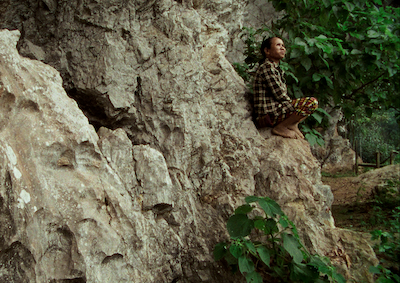Admission is free. No advance reservations. Your seat will be assigned to you when you pick up your ticket at the box office. Seats are assigned on a first come, first served basis. The box office opens one hour before the event.
Earth: the dreary backdrop for countless science fiction stories about future civilizations surviving through destruction, with no place left to go. On present-day Earth, humans are already struggling with the alarming effects of a warming climate. Increasing floods, hurricanes and fires are all too common and signs that worse is yet to come. This program’s films are documents of the Earth at its current stage mixed with dystopian speculations on the future. Moving through green spaces, caves and mountains, they remind us of the fragile rock that houses us, and that we must tend to in order to avoid catastrophic consequences.
Notes by Nicole Ucedo.
Special thanks to our community partners: Los Angeles Filmforum, Queer Film Los Angeles.
Gonawindua
Colombia, 2011
The Kogi, the Indigenous people and caretakers of the Sierra Nevada de Santa Marta in present-day Colombia, call its highest peak Gonawindua, “the heart of the world.” Gonawindua, shot partly nature documentary-style, shows the beating heart of the jungle in long shots of birds, animals and a Kogi man traversing the mountain landscape. As we follow the traveler, what seems like a peaceful scene of nature in sync proves to be an even more profound image of the strength of Gonawindua and the Kogi over the damage caused by settlers in a not-so-distant future.
DCP, color, in Kogi with English subtitles, 15 min. Directors: Giuliano Cavalli, Jorge Mario Suárez. Screenwriter: Jorge Mario Suárez. With: Camilo Alimaco, Luis Alimaco.
Field Resistance
U.S., 2019
Research-based filmmaker Emily Drummer examines the natural world up close with her 16mm camera. The fraught relationship between the worlds of nature and advancing technologies is captured through eerie scenes of plants in microscopes, burning fields and a giant sinkhole. Plant spores fill the screen accompanied by human breaths, at times deep, at times fast. An after-hours scene of greenhouse plants bathed in purple light reveals the plant world to have a secret life of its own, unfazed by human behavior. Perhaps the plants’ self-determination offers hope of their resilience beyond our human interference.
DCP, color, 16 min. Director: Emily Drummer.
The Tree House
Vietnam, 2019
In the year 2045, a man arrives on Mars, where he begins a new life away from home. He wants to make a film, but not about Mars, where his memories are empty. He contacts his father on Earth — the connection isn’t great, but he asks him about what life was like in Vietnam in the past. As his father describes to him how they built their home and shares other memories, we cruise around the Vietnamese mountains on a narrow windy road, on a densely foggy day. Filmmaker Minh Quy Truong documents the Ruc, Kor and Hmong peoples, asking them about their memories of their childhood homes in the mountains. The man finds that what is home to him on Mars and to the people he meets is not so different, or perhaps he only desires them to be similar.
The Tree House premiered at Locarno and later was presented at the International Film Festival Rotterdam. Truong brings his sensibilities to the screen in this gentle rumination about filmmaking, viewing and remembering. Shot on 16mm, the film’s touch is at once fuzzy and sharp: the images are clear but leave space to imagine the past as people talk about the childhoods we can no longer see. A common thread among some of the ethnic minorities he interviews is that they were made to leave home. One woman still returns to the cave she grew up in before soldiers forced her family down the mountain into town. She sleeps better there. Then again, don’t we tend to sleep better at home?
DCP, color, in Vietnamese and Hmong with English subtitles, 84 min. Director/Screenwriter: Minh Quy Truong.
Watch a trailer:






 Mobile Navigation
Mobile Navigation

